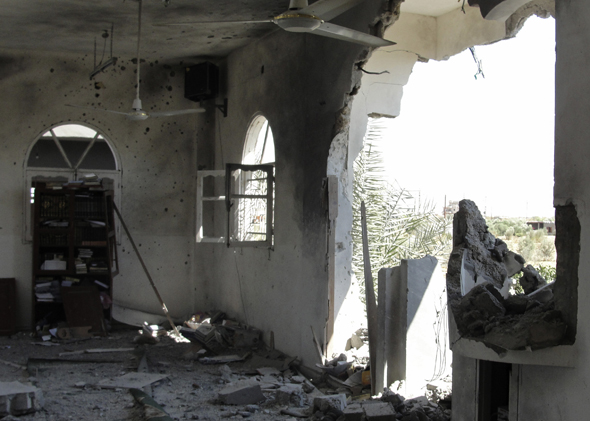In addition to the challenge from protests — and possibly beyond it — Egypt’s military-backed interim Government is contending with a rise in violence in the Sinai Peninsula. Salafists have attacked security forces, killing dozens since the July 3 coup.
Last month, Cairo decided to “take action against terrorists, instead of merely reacting to terrorist attacks”. It launched large-scale military operations against the Islamists, attacking their bases from the ground and the air.
Writing for Slate, Nadine Marroushi portrays an Egyptian military “conducting its war indiscriminately, not differentiating between civilians and militants”.
The black, charcoaled remains of a cow’s dead body lies in a sandy field behind a shelled-out mansion. Washed-out blood stains the walls of an unpainted grey room where sons say their 80-year-old mother was killed by army tank fire. Bullet holes pockmark the house. A 9-year-old girl’s cheek is marked by a pink incision where a rock hit her face as her home was strafed by helicopter fire. A child’s sandal and burned Quran were among the rubble of a mosque that locals say was destroyed by ground and air military troops. I watched as an IED exploded under an armored personnel carrier as it turned a corner. Black smoke filled the air, and an olive tree was uprooted. Later, two soldiers were reported injured….
I interviewed 30 people over three nights and four days in September in the two border villages of Muqataa and Mehdeya, and in El-Arish, north Sinai’s largest town. These people spoke of indiscriminate killing, shelling, looting, and the destruction of homes and a mosque.
One of the interviewees is a judge from a local tribe:
I was one of those that supported June 30 [mass protests against President Mohamed Morsi, just before he was removed by the military]. I had thought the army would be more professional in its operation, and target only those attacking it, but it isn’t. This campaign is excessive.
Another man warns:
“If there’s no political solution, you’ll start to see suicides on the border [with Gaza]. The area will explode if there’s no development.
And, as the start of the school year is delayed, a mother says:
I’m too scared to get school clothes and stationery for my children. I’m scared for the driver and me. There’s no guarantee we won’t get hit.
Marroushi writes of raids and detentions by security forces, concluding with this first-hand account:
Naeem and his mother, Hessa, said six army officers entered and ransacked their home on Sept. 22. They took his laptops, legal titles, television, two gas cylinders, his wife’s makeup, gold, and cash. They helped themselves to water in the fridge, and put pillowcases on the heads of Naeem’s 6-month-old twins when they cried. Then they burned his house to the ground. His home and his car repair shop were two of the buildings I saw blackening the sky with smoke the day before. The walls of his family’s home were still smoldering. Others villagers reported similar behavior.
“Why are they doing this? Do they not see us as human beings? We just want to understand,” says Naeem. “Do they want to expel us? If this is the case, say so, but don’t do it this way.”

